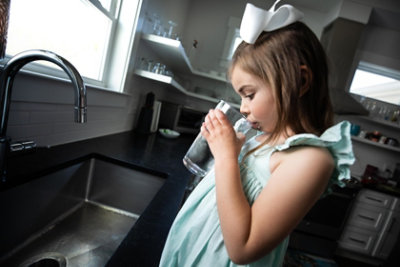Stop Wasting Water and Money. FIND A LOCAL PRO
What Is Deionized Water?
When it comes to water, you and your family need the best option available. After all, it’s your hydration we’re talking about! While researching the different types of water, you may have come across deionized water. What is deionized water — and is it a better choice than the stuff you’re already getting from your tap? Let’s dive in and find out.

Defining Deionized Water
Deionized water is water that has all positive and negative ions removed. If you need a chemistry refresher, an ion is an atom with a charge. If they’re positive, they have more protons than electrons; if they’re negative, it’s the reverse.
While water doesn’t have charged ions in its chemical structure, it can hold them as dissolved minerals. Positively charged ions found in water are called cations and can include:
- Lead
- Magnesium
- Iron
- Copper
- Calcium
- Sodium
If the ions have a negative charge, they’re called anions. Anions typically include:
- Nitrate
- Sulfate
- Fluoride
- Chloride
We are water Experts
Water quality is non-negotiable. To prove it, we've built state-of-the-art water quality labs and filled them with the best and brightest scientists — all so we can provide you with the best water of your life.

How to Deionize Water
Deionization is typically a two-step process. The first step is filtration in an ion exchange resin. As water flows through this filter, it forces the ions to exchange with other molecules. Hydrogen ions replace cations, and hydroxide ions replace anions. The hydrogen and hydroxide eventually combine to form a new water molecule.
The second step is called reverse osmosis. It works by using pressure to force the water molecules through a membrane. The water molecules are small enough to pass through with ease. However, larger particles, like minerals and contaminants, get trapped and left behind.
What's in your water?
start here
Worried about your water? Take control with our at-home water test kit. We'll analyze your water and recommend the best filtration or softening solution for your specific needs.

Benefits of Deionized Water
Deionized water has a ton of benefits for the scientific community. Because it has such small levels of impurities, it can be used for manufacturing drugs and cleaning sensitive equipment. But what about in your home?
Deionized water has fewer contaminants, so it’s excellent for cleaning windows and other glass surfaces. You might notice less streaking and staining — especially on dishes and silverware.
Your appliances will also love deionized water. With fewer minerals and contaminants flowing through, there may be less scale buildup, helping to extend the life of dishwashers, washing machines, and more.

Better Tasting Water in Your Home
Now that you know more about deionized water, you might be wondering — is it a good choice for my home? In most cases, no.
Deionized water lacks many helpful minerals we typically consume in water (like calcium and magnesium), so it’s not suitable for long-term drinking. Deionization also doesn’t kill off microorganisms or bacteria, which can affect your health.
Instead of seeking out an ion exchange resin filtration system for your home, you’re better off looking for standard all-house water filtration. These systems deliver great-tasting water right from the tap.
Whatever water filtration or purification system you’re looking for, Pentair is here to help. Enjoy water you can trust for your whole home.

Water 101
Unleash the secrets of your H2O! Explore where water originates and discover the various water filtration solutions that transform it into drinkable water.



